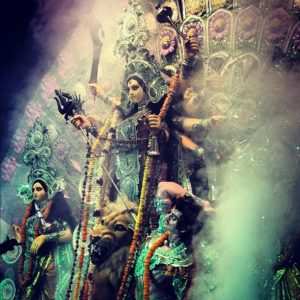ādyo ’vatāraḥ puruṣaḥ parasya
kālaḥ svabhāvaḥ sad-asan-manaś ca
dravyaṁ vikāro guṇa indriyāṇi
virāṭ svarāṭ sthāsnu cariṣṇu bhūmnaḥ
ādyaḥ — first; avatāraḥ — incarnation; puruṣaḥ — Kāraṇārṇavaśāyī Viṣṇu; parasya — of the Lord; kālaḥ — time; svabhāvaḥ — space; sat — result; asat — cause; manaḥ — mind; ca — also; dravyam — elements; vikāraḥ — material ego; guṇaḥ — modes of nature; indriyāṇi — senses; virāṭ — the complete whole body; svarāṭ — Garbhodakaśāyī Viṣṇu; sthāsnu — immovable; cariṣṇu — movable; bhūmnaḥ — of the Supreme Lord;
Srimad-Bhagavatam describes Maha-Vishnu as the first incarnation of the Supreme Lord in the process of creating the material worlds. He is the master of eternal time, space, cause and effects, mind, elements, material ego, the modes of nature, senses, the universal form of the Lord (Garbhodakashayi Vishnu) and the sum total of all living beings, both moving and nonmoving. He lies in a causal ocean that seperates the material and the spiritual worlds. Brahma, the creator, emerges from his navel sitting on a lotus, while Vishnu is adored by infinite beings of all planes.
The causal body of each individual jiva holds the seeds of the actions and desires which have sprouted and caused his present circumstances, as also will create his future conditions. When the summation of all the causal bodies of every single entity is taken together, a Being can be conceived who is known as the Isvara is the Upanishads. Therefore in popular language we describe Isvara as the Lord who has caused whole of creation to manifest, because He controls the causal state of all beings, therefore the roots of all karma. This is one way of understanding the description of Lord Visnu in this condition of rest on the causal Ocean.
But why is Lord Visnu shown in sleep? Again if we refer to the Upanishads we find that a normal man experiences his causal state only during deep, dreamless sleep. Vishnu also sleeps but being the Isvara it is not a normal sleep like humans, he is in yoga nidra, a yogic sleep, where He is well aware of all creation.
The sense of difference between the external and internal is due to our strong sense of individualization created by the ego. But every devata is both outside in the world as well as inside the seeker in some condition, either manifest or most likely yet to manifest. Only when by the dint of sadhana and great spiritual effort is someone able to obliterate the seeds of karma in his own causal body is the seeker, finally awakening Visnu, who sleeps inside his causal body, aware of all root causes of his individual manifestation, and using that transforming power enters into those rarified zones of the Eternal Spirit, worlds unimaginable even by the sharpest material intellect.
Photo: Lord Vishnu in Ananta Sayana from Deoghar Dasavatara Temple, medieval India. Source: Google.


